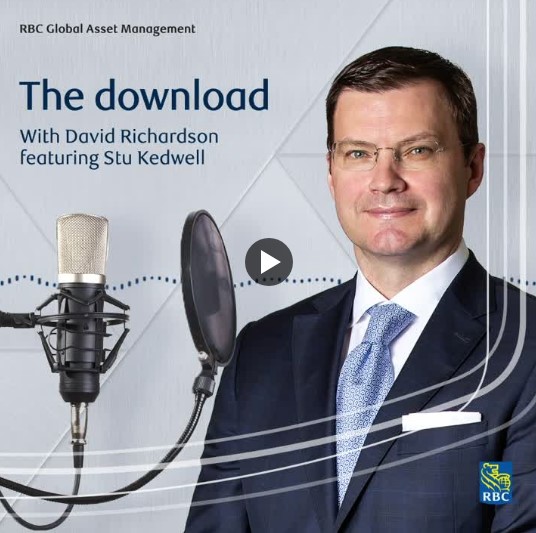From economic insights to mental health and resiliency, it’s all about the podcasts this week! In addition to our featured economic commentary below, we’ve included three interesting podcasts this week:
-
What’s driving the market rotation?
-
Chatter That Matters: Dan Ariely and Kelly Peters on Reinvention & Resilience
-
The Creativity Economy Part 1: A (New) Power Skill for the 2020s
Over the past few months we’ve been featuring the Take 2 Minutes articles that provide you with cyber security tips and tricks. This week we’ve included one that focuses on your devices and the updates that are often released. Find out why they are so important in the article below.
Did you miss one of our recent events? We will be sharing replays with you as soon as they are available, but in the meantime we’ve included the event replay from the recent RBC Wealth Management event, Living to 100: Financial planning for longevity. Your link, along with a few other related resources, are included in this week’s blog post.
As always, we end our weekly post with a few good news stories from in and around our community.
Your economic update
Markets continued to consolidate over the past week, grappling somewhat with elevated investor expectations. So far, the first quarter earnings season has been strong, but it has been met with a relatively muted response by most stocks, even by many of those that reported better than expected results. It suggests that good earnings may not quite be enough in the current climate. There are other factors at play, including supply chain bottleneck, inflation concerns, and the ongoing pandemic. This week, we provide a brief update on the coronavirus situation, and turn our sights to the one thing, other than the pandemic, that may matter the most: jobs.
Coronavirus update
Canada’s progress over the past week was a bit disappointing. The country’s seven-day average rate of new daily infections stands at 7,800, which represents an incremental drop from the same period a week ago. Only Ontario, Saskatchewan, and British Columbia experienced declines. Quebec had a modest increase in its average new infection rate, while Manitoba, Nova Scotia and Alberta all saw meaningful increases. The Northern Territories also saw a notable uptick. While Canada’s third wave of the virus appears to have peaked a few weeks ago, a more meaningful decline in new infections will only be driven by a drop across more provinces or a larger fall in some of the bigger provinces. Canadians undoubtedly hope to see both in the weeks to come.
Elsewhere, trends have largely remain unchanged. The U.S. continues to see steady declines, and Europe is also experiencing declines, though to varying degrees. India is garnering the most attention, given the sheer volume of new daily cases, with the country having recently reported more than 400,000 in a single day.
It’s (almost) all about jobs
In today’s day and age, everybody appreciates data. The same is true for investors, who consistently parse through financial statements, economic releases, and high frequency information – such as credit card spending, traffic congestion, and restaurant bookings, amongst other things – to gage the health of consumers, businesses, and economies. And while they all have merit, the one thing that may trump them all is the direction of the job market.
The employment situation in North America has come a long way over the past year. Between February and April 2020, Canada and the U.S. saw meaningful losses, roughly 3 million and 22 million respectively. From May 2020 onwards, both countries have seen significant gains, although Canada has been less consistent from one month to the next given the re-emergence of lockdowns across various provinces. Nevertheless, Canada’s job gains have amounted to well over 2 million, suggesting it has recouped more than three quarters of the job losses. Meanwhile, the U.S. has seen approximately 14 million jobs created since last April, and it has recouped two thirds of the jobs that were lost.
The positive employment trends should continue going forward, driven by the full reopening of economies later this year. However, it’s the pace of job creation that may be more important as it may foreshadow the timing of a larger shift in monetary policy, such as interest rate hikes, from the Bank of Canada and the U.S. Federal Reserve. The latter has indicated repeatedly that it is focused on getting the economy back to “maximum employment”, which is comparable to the level of employment prior to the onset of the pandemic. The U.S. has been averaging over 300,000 new jobs created per month for the past six months. Should that trend continue, the level of “maximum employment” will be reached in about two years. Job growth of nearly 600,000 new jobs per month would translate into a level of full employment by next summer.
Although the trend is positive, investors may be hoping for good, but not great, job growth. That would give central bankers enough of an excuse to keep policy unchanged for longer and support existing financial conditions, and consequently valuations in the bond and equity markets. A stronger trajectory may suggest that monetary conditions will have to be tightened sooner, forcing investors to more closely scrutinize valuations. At the end of the day, we welcome a backdrop marked by employment growth as opposed to the one we witnessed last spring. Nevertheless, we are mindful of the unique challenges presented by a much stronger job market and are prepared to adjust portfolios if need be.
What’s driving the market rotation?
 In this episode, Stu Kedwell, Co-Head of North American Equities with RBC Global Asset Management, shares his views on the evolving market landscape, particularly the recent growth-to-value shift. Stu also discusses the importance of considering both growth and value companies when investing, and the tools he uses to find potential opportunities.
In this episode, Stu Kedwell, Co-Head of North American Equities with RBC Global Asset Management, shares his views on the evolving market landscape, particularly the recent growth-to-value shift. Stu also discusses the importance of considering both growth and value companies when investing, and the tools he uses to find potential opportunities.
Listen to the podcast online: What’s driving the market rotation? [5 minutes, 49 seconds]
Chatter That Matters Podcast |
The Creativity Economy Part 1: A (New) Power Skill for the 2020s
 This episode of Disruptors, an RBC podcast, is the first in a special, two-part series on the “Creativity Economy” in which we now find ourselves as a result of the COVID-19 pandemic accelerating technological and societal changes already underway due to the 4th Industrial Revolution. Join host John Stackhouse and co-host Trinh Theresa Do as they sit down for a series of conversations with a dynamic and inspirational array of guests including the CEO of Cirque du Soleil, Daniel Lamarre, Professor Ajay Agrawal from the Rotman School of Management’s Creative Destruction Lab, Kyla Lee from Vancouver’s Acumen Law, Sara Diamond, the President Emerita of OCAD University, and Gil Moore, drummer and vocalist for the legendary rock band Triumph, and founder of Metalworks Institute.
This episode of Disruptors, an RBC podcast, is the first in a special, two-part series on the “Creativity Economy” in which we now find ourselves as a result of the COVID-19 pandemic accelerating technological and societal changes already underway due to the 4th Industrial Revolution. Join host John Stackhouse and co-host Trinh Theresa Do as they sit down for a series of conversations with a dynamic and inspirational array of guests including the CEO of Cirque du Soleil, Daniel Lamarre, Professor Ajay Agrawal from the Rotman School of Management’s Creative Destruction Lab, Kyla Lee from Vancouver’s Acumen Law, Sara Diamond, the President Emerita of OCAD University, and Gil Moore, drummer and vocalist for the legendary rock band Triumph, and founder of Metalworks Institute.
You can listen to the podcast online: A (New) Power Skill for the 2020s
Living to 100: Financial planning for longevity |
Take 2 Minutes: Updating Your Devices and Software
 Keeping your devices, apps and software up to date helps keep your devices safe from bugs and security issues, and it means you can access new features.
Keeping your devices, apps and software up to date helps keep your devices safe from bugs and security issues, and it means you can access new features.
Learn more in this article: Take 2 Minutes: Updating Your Devices and Software
Community Corner
Each week, we like to end our blog posts with a few good news stories from in and around the community. We hope that they brighten your day!
- Gallery: Checking out space from a Guelph backyard
- Donation gives training funds and mental health supports for local nurses
- Guelph researchers donating 2,000 kilos of beans following crop study
- ‘No questions asked’: Halton Hills library now offering food for those in need
- ‘Sign wars’ popping up across Wellington County
- Trio of Guelph authors nominated for prestigious literary awards
- Guelph/Eramosa girl hosts TVOKids series about life on the farm
As always, we are available to connect with you personally. Please don’t hesitate to contact us at 519-822-2024 or elineskyschuett@rbc.com.


